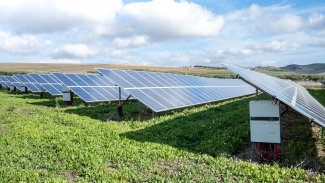There is no economic case for new coal plants in India
India is the world’s third-largest emitter of CO2 and coal-fired power plants contribute approximately half of India’s CO2 emissions. Indian government policies assume a significant expansion of coal-fired power in India over the next two decades. This paper compares the costs of coal and renewable power, including quantifiable domestic external costs, in 2018 as well as projections for 2025. Our estimate for the environmental cost of coal is 2.4 US ¢/KWh (1.64 Rs.KWh) in the financial year 2018–19.
There is no economic case for more coal power plants in India
EfD researchers E. Somanathan and Shoibal Chakravarty argue in a study that backing the coal plants expansion policy is flawed . They outline the private and external costs of electricity from coal

EfD Kenya discussed policies with stakeholders
EfD Kenya arranges a policy day workshop every year with researchers, policymakers, and other stakeholders, to discuss research findings and their potential implications on environmental policies and…
Forecasting natural gas prices using highly flexible time-varying parameter models
Distinctive regional characteristics in different natural gas markets have increased the difficulty in accurately forecasting natural gas prices. Moreover, the natural gas markets have experienced great structural instability due to advancement in technology and rapid financialization over the past few decades.
Uncertainty-dependent and sign-dependent effects of oil market shocks
This paper investigates the uncertainty-dependent and sign-dependent effects of the oil market fundamental shocks, namely supply, aggregate demand and oil-specific demand shocks. We do so by first proposing a novel oil uncertainty index that is measured by the stochastic volatility of the unpredictable component of oil prices. We then employ a nonlinear model and find that the all reactions of oil production, real price of oil, and global economic activity to the structural shocks are regime-dependent.
Energy efficiency in the Kenyan manufacturing sector
As one of the highest energy-consuming sectors, Kenya’s manufacturing sector share of electricity consumption in 2019 was 50.16%. That of fuel consumption was 12%, the second-highest after the transport sector. It is therefore important to analyze the sector’s energy efficiency and its determinants.
Unlocking climate finance potential and policy barriers—A case of renewable energy and energy efficiency in Sub-Saharan Africa
Sub-Saharan African is in a unique position to reap the socio-economic and environmental benefits of renewable resources, and the energy efficiency practices as the demand for energy in the continent grows. Assessment of the financing potential and the related obstacles for the financing deployment of renewable energy and energy efficiency sectors mapping will be a step forward to help in mobilizing the financial flows into sectors.
Perceptions of problems and preferences for solutions: The case of poor air quality in central-southern Chile
Air pollution in urban areas is one of the most severe environmental problems facing developing and transition economies. In Chile, many cities exceed the World Health Organization's norms for ambient concentration of particulate matter. In this paper, we analyze the factors explaining individuals' perceptions on fuelwood as the main cause of air pollution in urban areas and their willingness to ban this fuel to counteract its negative effects.
Pagination
- Previous page
- Page 27
- Next page



